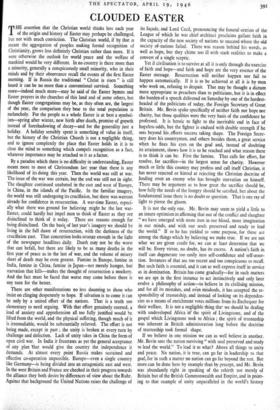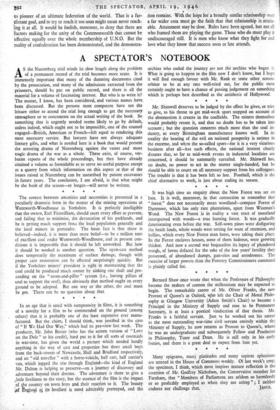CLOUDED EASTER
THE assertion that the Christian world thinks less each year of the origin and history of Easter may perhaps be challenged, but not with much conviction. The Christian world, if by that is meant the aggregation of peoples making formal recognition of Christianity, grows less definitely Christian rather than more. If it were otherwise the outlook for world peace and the welfare of mankind would be very different. In no country is there more than a minority, generally a conspicuously small minority, who in their minds and by their observance recall the events of the first Easter morning. If in Russia the traditional " Christ is risen " is still heard it can be no more than a conventional survival. Something more—indeed much more—may be said of the Easter hymns and Easter prayers in the churches of this land and of some others, but though Easter congregations may be, as they often are, the largest of the year, the comparison they bear to the total population is melancholy. For the people as a whole Easter is at best a symbol- ism—spring after winter, new birth after death, promise of grqwth instead of foreshadowing of decay—and for the generality just a holiday. A holiday sensibly spent is something of value in itself, but the history of the Christian Church is not a negligible thing, and to ignore completely the place that Easter holds in it is to close the mind to something which compels recognition as a fact, whatever importance may be attached to it as a factor.
By a paradox which there is no difficulty in understanding, Easter meant more to most of Christendom last year than there is any likelihood of its doing this year. Then the world was still at war. The issue of the war was certain, but the end was still not in sight. The slaughter continued unabated in the east and west of Europe, in China, in the islands of the Pacific. In the familiar imagery, the world was still undergoing its crucifixion, but there was warrant already for confidence in resurrection. A war-time Easter, especi- ally what there was ground for believing might be the last war- Easter, could hardly but impel men to think of Easter as they are disinclined to think of it today. There are reasons enough for being disinclined. On the basis. of last year's imagery we should be living in the full dawn of resurrection, with the darkness of the crucifixion past. That conception looks strange enough in the light of the newspaper headlines daily. Death may not be the worst that can befall, but there are likely to be as many deaths in the first year of peace as in the last of war, and the volume of misery short of death may be even greater. Famine in Europe, famine in India, famine in China, famine in Japan—not merely hunger, but starvation that kills—makes the thought of resurrection a mockery. And the fact must be faced that worse may come before there is any turn for the better.
There are other manifestations no less daunting to those who insist on clinging desperately to hope. If salvation is to come it can be only by a united effort of the nations. That is a truth too elementary to need arguing. With that effort genuinely exerted, a load of anxiety and apprehension all too fully justified would he lifted from the world, and the physical suffering, though much of it is irremediable, would be substantially relieved. The effort is not being made, except in part ; the unity is broken at every turn by challenge and defection. Lack of unity takes in China the form of open civil war. In India it frustrates as yet the general acceptance of any plan that would give the country the independence it demands. At almost every point Russia makes sustained and effective co-operation impossible. Europe—even a single country like Germany—is being divided into an antagonistic east and west. In the west Britain and France are checked in their progress towards the alliance they both desire by differences of view about the Ruhr. Against that background the United Nations raises the challenge of its facade, and Lord Cecil, pronouncing the funeral oration of the League of which he was chief architect proclaims gallant faith in the capacity of the new society of nations to succeed where the old society of-nations failed. There was reason behind his words, as well as hope, but they chime too ill with stark realities to make a convert of a single sceptic.
Yet if civilisation is to survive at all it is only through the exercise of faith and hope—and faith and hope are the very essence of the Easter message. Resurrection will neither happen nor fail to happen automatically. If it is to be achieved at all it is by men who work on, refusing to despair. That may be thought a dictum more appropriate to preachers than to politicians, but it is in effect the burden of a speech delivered on Saturday by one of the hardest- headed of the politicians of today, the Foreign Secretary of Great Britain. Mr. Bevin spoke specifically of neither faith nor hope nor charity, but those qualities were the very basis of the confidence he professed. It is heroic to fight to the inevitable end in face of hopeless odds, but the fighter is endued with double strength if he sees beyond his, efforts success taking shape. The Foreign Secre- tary does his countrymen, and others besides them, a great service when he fixes his eyes on the goal and, instead of doubting its attainment, shows how it is to be reached and what reason there is to think it can be. First the famine. That calls for effort, for resolve, for sacrifice—in the largest sense for charity. However much or little this country may profess and call itself Christian, it has never rejected or hinted at rejecting the Christian doctrine of feeding even an enemy who has brought starvation on himself. There may be argument as to how great the sacrifice should be, how fully the needs of the hungry should be satisfied, but about the fundamental issue there is no doubt or question. That is one ray of light to pierce the gloom.
It is not the only one. Mr. Bevin may seem to yield a little to an innate optimism in affirming that out of the conflict and slaughter " we have emerged with more iron in our blood, more imagination in our minds, and with our souls preserved and ready to lead the world." If so he has yielded to some purpose, for these are among the things which by believing we make true. If we are not what we are given credit for, we can at least determine that we will be. Every virtue, no doubt, has its excess. A nation's faith in itself can degenerate too easily into self-confidence and self-asser- tion. Instances of that are too recent and too conspicuous to recall. But such faith is essential, and it can as well express itself in service as in domination. Britain has come gradually—for in such matters we are apt in the first instance to act instinctively and only later evolve a philosophy of action—to believe in its civilising mission, and for all its mistakes, and even misdeeds, it has accepted the re- sponsibility of trusteeship, and instead of looking on its dependen- cies as a means of enrichment votes millions from its Exchequer for their welfare. It is not a negligible thing the we should be dealing with undeveloped Africa in' the spirit of Livingstone, and of the gospel which Livingstone took to Africa ; the spirit of trusteeship was inherent in British administration long before the doctrine of trusteeship took formal shape.
If we believe in one mission we can as well believe in another. Mr. Bevin sees the nation surviving " with soul preserved and ready to lead the world." To lead it to what? Above all things to unity and peace. No nation, it is true, can go far in leadership to that goal, for in such a matter no nation can go far beyond the rest. But more can be done here by example than by precept, and Mr. Bevin was abundantly right in speaking of the rebirth not merely of Britain but of the British Commonwealth and Empire, and in point- ing to that example of unity unparalleled in the world's history as pioneer of an ultimate federation of the world. That is a far- distant goal, and to try to reach it too soon might mean never reach- 6'ng it at all. It would be foolish, moreover, to deny that there are factors making for the unity of the Commonwealth that cannot be 'effective equally over the whole membership of U.N.O. But the reality of confederation has been demonstrated, and the demonstra- tion remains. With the hope for a broadly similar relationship over a far wider area must go the faith that that relationship is attain- able. Attainment may be slow. Rules have been agreed, but not all who framed them are playing the game. Those who do must play it undiscouraged still. It is men who know what they fight for and love what they know that success soon or late attends.































 Previous page
Previous page